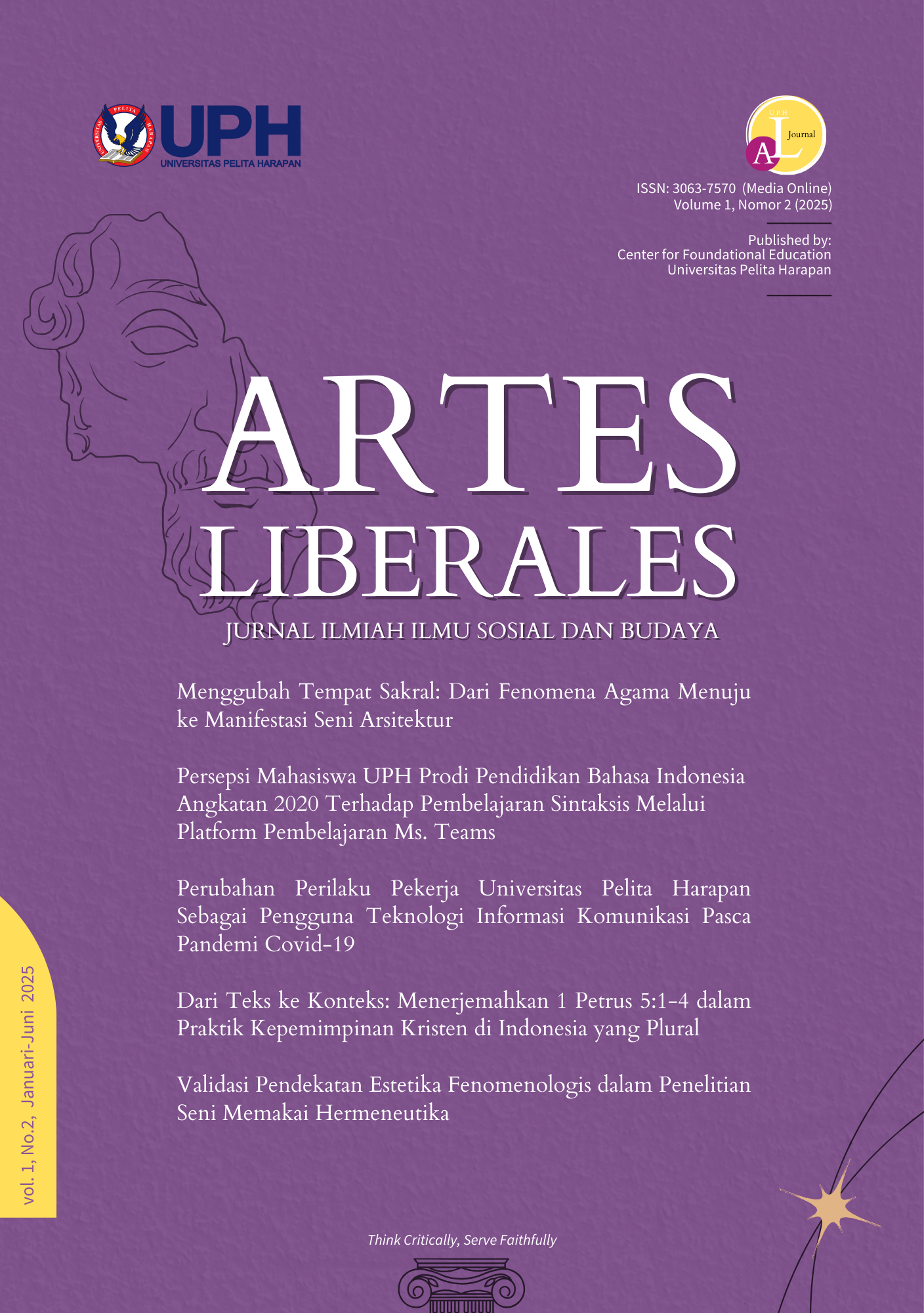Dari Teks ke Konteks: Menerjemahkan 1 Petrus 5:1-4 dalam Praktik Kepemimpinan Kristen di Indonesia yang Plural
Keywords:
kepemimpinan kristen, plural, 1 Petrus 5:1-4Abstract
Abstrak
Tulisan ini berupaya memberikan satu tawaran praktis tentang kepemimpinan Kristen di tengah pluralitas Indonesia yang ditinjau dari teks 1 Petrus 5:1-4. Latar belakang penelitian ini dilakukan karena terjadinya berbagai tindakan yang merugikan di tengah-tengah bangsa Indonesia dalam berbagai interaksi sosial-politik masyarakat yang ditengarai akibat dari pluralitas bangsa Indonesia. Konflik sosial-politik masyarakat Indonesia kemungkinan salah satunya terjadi karena krisis kepemimpinan di Indonesia. Sementara itu, kepemimpinan Kristen diyakini sebagai alat yang mampu memberikan jawaban atas krisis kepemimpinan yang terjadi di Indonesia dengan prinsip-prinsip kebenaran dalam kepemimpinan Kristen. Penelitian ini menggunakan pendekatan hermeneutika khususnya pada teks 1 Petrus 5:1-4. Hasil penelitian menunjukkan bahwa kepemimpinan Kristen memberikan tawaran praktis yang realistis dan dapat diimplementasikan dalam konteks Indonesia yang plural. Terdapat empat karakteristik yang ditawarkan dalam kepemimpinan Kristen berdasarkan hermeneutika dari teks 1 Petrus 5:1-4 yang dapat diterapkan pada konteks pluralitas Indonesia.
Abstract
This paper attempts to provide a practical offer on Christian leadership during Indonesian plurality which is reviewed from the text of 1 Peter 5: 1-4. The background of this research is due to the occurrence of various detrimental actions amid the Indonesian nation in various socio-political interactions that are suspected to be the result of the plurality of the Indonesian nation. The socio-political conflicts of the Indonesian people may have occurred due to the leadership crisis in Indonesia. Meanwhile, Christian leadership is believed to be a tool that can provide answers to the leadership crisis that occurs in Indonesia with the principles of truth in Christian leadership. This research uses a hermeneutic approach, especially in the text of 1 Peter 5:1-4. The results show that Christian leadership provides a practical offer that is realistic and can be implemented in the context of plural Indonesia. There are four characteristics offered in Christian leadership based on the hermeneutics of the text of 1 Peter 5:1-4 that can be applied in the context of Indonesian plurality.
References
Darmaputera, E. (2005). Kepemimpinan dalam Perspektif Alkitab. Kairos Books.
Ensiklopedi Alkitab Masa Kini Jilid 1 A-L (11 ed.). (2011). Yayasan Komunikasi Bina Kasih.
Farisa, F. C. (2024). Survei Indikator: Kepuasan Publik terhadap Jokowi Turun Jadi 76,6 Persen. Kompas.com. https://nasional.kompas.com/read/2024/02/29/12060191/survei-indikator-kepuasan-publik-terhadap-jokowi-turun-jadi-766-persen
Harrison, E. F. (1987). Introduction to the New Testament. WM. B. Eerdmans Publishing Company.
Henry, M. (2016). Tafsiran Matthew Henry: Surat Ibrani, Yakobus, 1 & 2 Petrus, 1-3 Yohanes, Yudas, Kitab Wahyu (J. Tjia & B. van der Djeffry (Ed.); I. Ardaneswari, H. Aprilani, L. Murtihardjana, P. A. Rajoe, V. Setyawati, & T. Susilawati (Penerj.)). Momentum.
Lumintang, S. I. (2015). Theologia Kepemimpinan Kristen: Theokrasi di Tengah Sekularisasi Gereja Masa Kini (D. A. Lumintang, A. Pasang, E. Hulu, & M. Rompa (Ed.)). Geneva Insani Indonesia.
MacArthur, J. (2012). Kitab Kepemimpinan: 26 Karakter Pemimpin Sejati (D. Setiawan (Penerj.)). Gunung Mulia.
Nikijuluw, V. P. H., & Sukarto, A. (2014). Kepemimpinan di Bumi Baru: Menjadi Pemimpin Kristiani di Tengah Dunia yang Terus Berubah (T. L. Perkantas (Penerj.)). Perkantas Jakarta.
Pamudji, S. (1989). Kepemimpinan Pemerintahan di Indonesia. Bina Aksara.
Pasaribu, F. D., Pardede, F. V. M., & Banurea, D. S. R. (2024). Tafsir Historis Kritis terhadap 1 Petrus 5:1-11. Tri Tunggal, 2(3), 10-21. https://doi.org/https://doi.org/10.61132/tritunggal.v2i2.363
Purbolaksono, A. (2023). Evaluasi Peraturan Bersama Menteri Agama dan Menteri Dalam Negeri Nomor 9 dan 8 Tahun 2006 Guna Menjaga Kerukunan Umat Beragama. In The Indonesian Institute.
Rini, W. A., Soinbala, N. C., & Arifianto, Y. A. (2024). Efektivitas Kepemimpinan Kristen yang Berintegritas: Sebuah Perspektif Etis-Teologis. Jurnal Teruna Bhakti, 7(1), 39-49. https://doi.org/https://doi.org/10.47131/jtb.v6i1.209
Rupa, C. S. (2016). Ciri Khas Seorang Gembala Berdasarkan Perspektif 1 Petrus 5:4. Jurnal Jaffray, 14(2), 165-188.
Sendjaya, S. (2021). Leadership Reformed (Reformasi Kepemimpinan): Mengapa Pemimpin Membutuhkan Injil untuk Mengubah Dunia (P. Manurung (Penerj.)). Literatur Perkantas Jawa Timur.
SETARA Institute for Democracy and Peace. (2024). Kondisi Kebebasan Beragama Berkeyakinan (KBB) 2023: Dari Stagnasi Menuju Stagnasi Baru. In SETARA Institute for Democracy and Peace. https://setara-institute.org/wp-content/uploads/2024/06/Rilis-Data-Kondisi-KBB-2023_Setara-Institute_Ind.pdf
Tomatala, Y. (1997). Kepemimpinan yang Dinamis. YT Leadership Foundation.
Wienanto, S. A. (2024). Perludem Prihatin Peringkat Indeks Demokrasi Indonesia Turun Dua Peringkat Tiap Tahun. tempo.co. https://www.tempo.co/politik/perludem-prihatin-peringkat-indeks-demokrasi-indonesia-turun-dua-peringkat-tiap-tahun-52175.
Downloads
Published
Issue
Section
License
Copyright (c) 2025 Harlinton Simanjuntak

This work is licensed under a Creative Commons Attribution-ShareAlike 4.0 International License.
Authors who publish with this journal agree to the following terms:
1) Authors retain copyright and grant the journal right of first publication with the work simultaneously licensed under a Creative Commons Attribution License (CC-BY-SA 4.0) that allows others to share the work with an acknowledgement of the work's authorship and initial publication in this journal.
2) Authors are able to enter into separate, additional contractual arrangements for the non-exclusive distribution of the journal's published version of the work (e.g., post it to an institutional repository or publish it in a book), with an acknowledgement of its initial publication in this journal.
3) Authors are permitted and encouraged to post their work online (e.g., in institutional repositories or on their website). The final published PDF should be used and bibliographic details that credit the publication in this journal should be included.”

